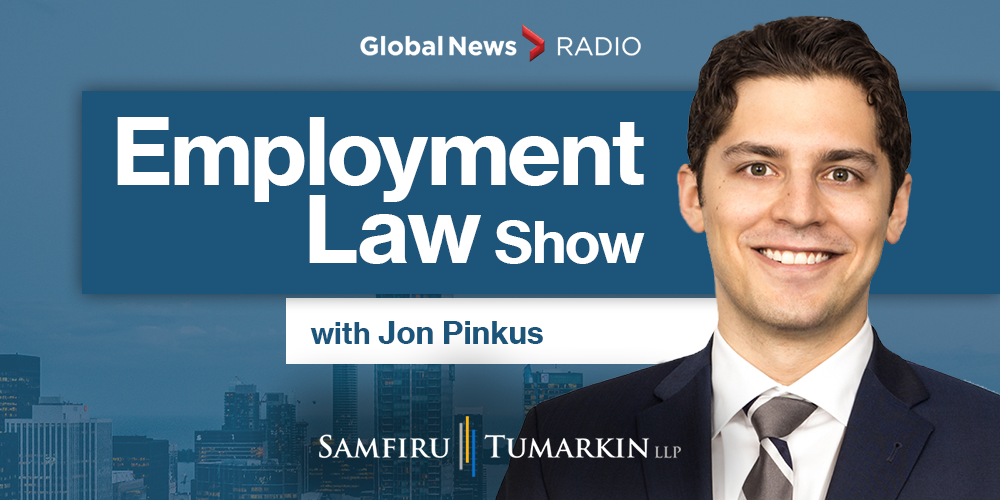Employment Law Show 640 Toronto – S9 E61

Episode Summary
The commandments of termination of employment, for-cause termination, and more on Season 9 Episode 61 of the Employment Law Show on Global News Radio 640 Toronto.
Listen below as Employment Lawyer and partner Jon Pinkus, Associate at Samfiru Tumarkin LLP, reveals your workplace rights in Toronto and the GTA on the Employment Law Show. Jon shatters myths and misconceptions about severance pay, terminations, workplace harassment, overtime pay, wrongful dismissal, constructive dismissal, duty to accommodate, independent contractors, and more.
Listen to the Episode
Episode Notes
I’m a line worker and my employer has not been following COVID-19 health guidelines. I reported this to the Ministry of Labour after no one took my concerns seriously and was fired for cause. What are my rights?
All employees have a right to work in a healthy and safe work environment and also have the right to file complaints with the Ministry of Labour, free from reprisals. Employers who penalize employees for doing so cannot be terminated for cause and should contact an employment lawyer as soon as possible. Employees should not fear reporting incidents regarding health and safety.
I was told as I worked for a small company, I was only owed seven weeks’ pay as I had signed a contract with a termination clause. Is this clause enforceable?
Termination clauses are rarely enforceable; employees who have signed a contract with a termination clause should contact an employment lawyer in order to determine whether or not it is actually enforceable. Employees who are offered a release should seek legal advice before signing it.
Learn More
Severance Pay in Ontario
Severance in BC
Severance in Alberta
Employees should consider termination when accepting a new job.
It is important for employees to look closely at an employment contract at the start of new employment as agreements often include termination clauses that seek to limit severance entitlements.
How can an employee enforce their rights if there is a catch-all clause in their employment contract?
There are often clauses that seek to limit an employee’s ability to pursue a constructive dismissal and allow an employer to implement changes to an employee’s terms of employment. However, it is important to remember that significant changes to employment might still be grounds for constructive dismissal.
My wife has had to take some time off work due to childcare reasons. She will be returning to work soon, but her employer has not given her any shifts. What should she do?
It is important for employees to communicate with their employers if they feel they have been laid off or dismissed. Seeking legal advice could also be of help in navigating the situation as employees cannot be terminated due to childcare reasons.
I was recently made aware that when applying for my pension, that I was terminated for cause. What are my rights?
It is typically very difficult for employers to be able to prove termination for cause. A mistake made by an employee is usually not enough to pursue for-cause termination, particularly if the event in question took place years ago.
My employer let me know that after one year I will no longer have my job. Can they do this?
Employers are within their rights to give employees working notice. Working notice is typically implemented in order to save employers paying larger severance entitlements to employees.
Employees should not give up termination rights after they start employment.
Employees should be wary of signing a new contract after they have already begun employment. Often, a new contract is offered in order to limit an employee’s rights, specifically regarding severance entitlements.
I was asked to work in a different department at my company and I refused as that was not part of my original job description. Is this a constructive dismissal?
It is important to determine whether or not the change in department position has a reduction in compensation or simply a lateral change that does not have a significant change to terms of employment. In Ontario, significant changes, such as a demotion, are considered to be grounds for constructive dismissal.
Employees should respond to any negative reviews or discipline.
Employees who receive a performance improvement plan should be aware that an employer is preparing to terminate their employment for cause. Employees who do not agree with criticism should communicate their disagreement to their employer in writing. It is important to keep records of all communication for possible legal purposes.
Employees should keep records of employment events.
Employees who experience harassment or bullying in the workplace should document all incidents in writing, such as e-mail correspondence.




